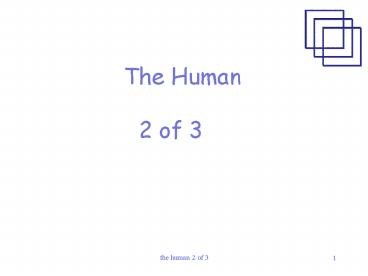The Human PowerPoint PPT Presentation
Title: The Human
1
The Human
- 2 of 3
2
(No Transcript)
3
(No Transcript)
4
the human
- Human 1 Information i/o
- visual, auditory, haptic, movement
- Human 2 (today)
- Information stored in memory
- sensory, short-term, long-term
- Human 3
- Information processed and applied
- reasoning, problem solving, skill, error
- Emotion influences human capabilities
- Each person is different
5
Memory
- There are three main types of memory function
- Sensory memories
- Short-term memory or working memory
- Long-term memory
- Selection of stimuli governed by level of
arousal.
6
Think about
- What this means for HCI
- ?
- ?
- ?
- ?
- We will come back to this at the end of the
lecture
7
Sensory memory
- Buffers for stimuli received through senses
- iconic memory visual stimuli
- echoic memory aural stimuli
- haptic memory tactile stimuli
- Examples
- sparkler trail
- stereo sound
- Continuously overwritten
8
Short-term memory (STM)
- Scratch-pad for temporary recall
- rapid access 70ms
- rapid decay 200ms
- limited capacity - 7 2 chunks
- Some research suggests that programmers have
better short-term memory than average people - This means you will have better short-term memory
than your users!
9
A Chunk is 1 item in short term memory
- 212348278493202
- 0121 414 2626
- HEC ATR ANU PTH ETR EET
- Microsoft product keys ?
10
Long-term memory (LTM)
- Repository for all our knowledge
- slow access 1/10 second
- slow decay, if any
- huge or unlimited capacity
- Two dominant types of access structure
- episodic serial memory of events
- semantic structured memory of facts, concepts,
skills - semantic LTM derived from episodic LTM
11
Interesting trivia
- Mega memory techniques
- Combine episodic and semantic
- Experienced programmers
- Use chunked techniques that they have used before
to solve problems - They decompose the problem into bigger chunks
than a novice programmer - Then apply known solution to each chunk
- Takes about 10 years to build up repertoire
12
Long-term memory (cont.)
- Semantic memory structure
- provides access to information
- represents relationships between bits of
information - supports inference
- Model semantic network
- inheritance child nodes inherit properties of
parent nodes - relationships between bits of information
explicit - supports inference through inheritance
13
LTM - semantic network
14
Models of Long Term Memory - Frames
- Information organized in data structures
- Slots in structure instantiated with values for
instance of data - Typesubtype relationships
DOG Fixed legs 4
Default diet carniverous sound
bark Variable size colour
COLLIE Fixed breed of
DOG type sheepdog Default
size 65 cm Variable colour
15
Models of LTM - Scripts
- Model of stereotypical information required to
interpret situation - Script has elements that can be instantiated with
values for context
16
Models of LTM - Production rules
- LTM is not only facts it is also rules
- Representation of procedural knowledge.
- Condition/action rules
- if condition is matched
- then use rule to determine action.
IF dog is wagging tail THEN pat dog IF dog is
growling THEN run away
17
LTM - Storage of information
- rehearsal
- information moves from STM to LTM
- total time hypothesis
- amount retained proportional to rehearsal time
- distribution of practice effect
- optimized by spreading learning over time
- structure, meaning and familiarity
- information easier to remember
18
LTM - Forgetting
- decay
- information is lost gradually but very slowly
- interference
- new information replaces old retroactive
interference - old may interfere with new proactive inhibition
- so may not forget at all memory is selective
- affected by emotion can subconsciously
choose' to forget
19
LTM - retrieval
- recall
- information reproduced from memory can be
assisted by cues, e.g. categories, imagery - recognition
- information gives knowledge that it has been seen
before - less complex than recall - information is cue
20
Applying this to your learning
- Mind maps
- Pre-read
- Take notes
- Revise
- Look for connections between subjects
21
What does this means for HCI
- Have you learnt anything new today?
- What does this mean for hci?
- ?
- ?
- ?
- ?

